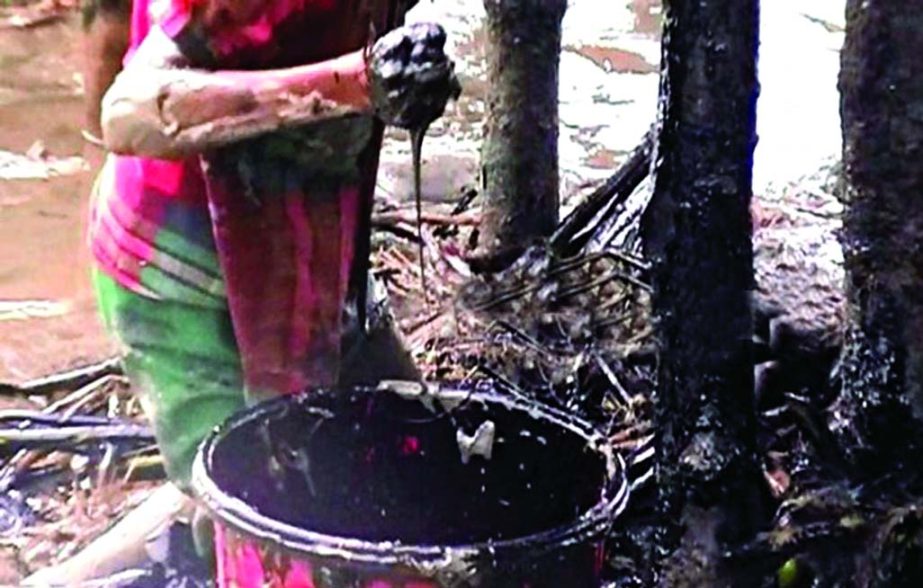
Staff Reporter :The wildlife and aquatic creatures of Sundarbans, the world’s largest mangrove forest, is facing a major threat as over 100 kilometers of the Sundarbans East Zone has already been painted with oil slick since oil tanker Southern Star 7′ capsized in the Shela River three days back, officials and experts said.The 140,000-hector forest shared by Bangladesh and India is home to about 260 species of birds and other animals, including the Royal Bengal Tiger, Irabati dolphin, estuarine crocodile and Indian python. The UNESCO world heritage site is intersected by many rivers and their tributaries. Thousands of litres of oil have already spilled into a vast area of the protected Sundarbans mangrove after a tanker collided with another vessel on Tuesday, posing serious threat to the entire eco-system of the forest, they added. They said various types of dolphins, fish, deer, monkey, bird, plants and other aquatic creatures have already started dying. More loss of wildlife and aquatic creatures are apprehended if the authorities fail to clean up spilled oil from the affected areas immediately. “The biodiversity of Sundarbans now faces a potential threat. The waters of two rivers of the Sundarbans have already contaminated by oil and it led to decline of the required level of oxygen for breathe of rare dolphins,” Prof Tanzim, an environmental researcher, told The New Nation yesterday. He added: Three things may have happened following such development. Either the dolphins have to choke to death, or they have travel to upstream into deeper forest, or they have to swim downstream towards the sea.The huge amount of oil on the water would heavily affect the coastal biodiversity for a long time, said Dilip Kumar Dutta, a professor of Environmental Science Department at Khulna University.He said there was a poor chance that high and low tide would clean up the oil from that part of the river fast because water flow in the downstream was not strong.Terming this effort ‘inadequate’, Prof Datta said a large scale skimming using larger vessels should be undertaken rather than solely relying on the primitive skimming carried out by the local people. Prof Dilip Kumar visited the affected areas on Friday as a member of the seven-member inspection team formed by the government to assess the impact of the oil spill. He said, “I don’t suggest using chemical dispersant now as the oil slick has already spread across a large area. Using huge chemical dispersant can also be disastrous for the biodiversity.” “The oil slick will create physical barrier on the water surface to the passing of oxygen as well as to the respiration of the mangrove trees ashore,” he said, “I’m worried that my students have reported that they noticed oil slick already spreading across the shorelines.” Great extents of the roots of juvenile mangrove trees and the small grasses that grow in abundance in numerous small creeks have already been flooded by the tide water carrying the oil slick, he noted. Prof Datta recommended that the authorities should keep adequate skimming equipment and vessels stand by at Mongla Port so that the clean-up operation could be initiated in due time in case such accidents take place in the coming days. “The Mrigmari-Nandabala-Andharmanik dolphin sanctuary is facing serious threat due to the oil spill,” said Amir Hussain Chowdhury, forest officer of Sundarbans East Region.He said this catastrophe is unprecedented in the Sundarbans and we don’t know how to tackle this.”We’re worried about its long-term impact because it happened in a fragile and sensitive mangrove ecosystem,” he noted.Meanwhile, the clean up operation of furnace oil from the water in the Sundarbans received very poor responsive due to insufficient preparation and motivation by the concerned department.Local fishermen and villagers were seen mopping up oil from river water with sponge, pots, pans and sacks riding on engine-driven boats in the Shela River, but it did not help much because of low participation of the local people. As of Friday afternoon, local people have managed to collect about 2,000 litres of the spilled oil, according to officials of Padma Oil Company Ltd. which has opened an outlet to buy the oil from the local people. State-owned Padma Oil Company Limited contractors are buying it from them at a rate of Tk 30 per litre.The situation was getting worse as the departments and agencies which are supervising the task, are not equipped with required technology to clean up the oil rapidly, many alleged.Rustam Khan, a resident of Mongla upazila, said although the spilled oil is spreading to different canals and water bodies in the Sundarbans, some people collected the floating furnace oil in some areas. Many fishermen said they found no fish in the affected areas as they went on fishing over the last two days. Faruk Khan, a fisherman of the locality, said he only found some dead fishes two days back and since then fishes have disappeared. Sights of birds and other wildlife are also becoming scantier in the area. Earlier, the Department of Shipping and the Forest Department and Environment Ministry formed three separate committees to investigate the incident.Assistant Forest Conservator Abul Kalam Azad filed a Tk 1.0 billion crore compensation suit against owners of ‘Total’ and Southern Star 7 over the incident.The government’s two probe bodies formed to investigate the oil tanker capsize visited the spot to inspect the reason of the accident, measure the impact of the spilled oil and if there is any negative effects of spraying the ‘oil spill dispersant’.

